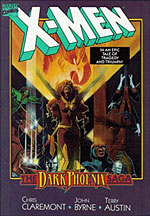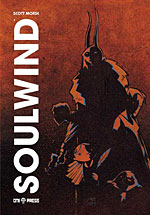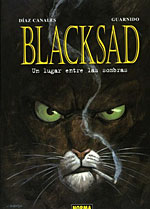>> Top Nine: Wheeler's Choice
>> Comment: 'San Diego', To The Tune Of 'Desperado'
More...

Journalist Andrew Wheeler is one of the three founding editors of Ninth Art, and he's been wrangling copy and chasing contributors for the site from day one. His other contributions include his Glossary of Comic Book Terms, his campaign for greater gay representation in comics, and interviews with Greg Rucka, Ted Naifeh, Scott Morse and others. He was one third of Triple A, and is the only person proud and stubborn enough to have served on the Forecast for its entire duration. In the first instalment of this new series, Andrew looks back at the nine comics that matter most to him, beginning - and ending - in France.
ASTERIX AND THE CHIEFTAIN'S SHIELD
Rene Goscinny and Albert Uderzo
The first comics I can remember reading were British weekly humour comics like WHIZZER AND CHIPS and BUSTER. But the first comics I can remember treasuring were the ASTERIX books.
European kids have been weaned on ASTERIX since 1959, and they've always felt like a shared experience. Everyone at my school would read them and swap them around, and my own copies came down to me through three siblings. One 48-page ASTERIX book could keep me going through a long car journey, and those same 48 pages could stand up to endless re-reading; the puns never grew old, and the caricatures never stopped being funny. Of all the series, THE CHIEFTAIN'S SHIELD, with Asterix and Obelix on the quest for the shield of Vercingetorix, is probably the one I've lovingly destroyed the most copies of.
THE DARK PHOENIX SAGA
Chris Claremont, John Byrne and Terry Austin
 I agonised over whether to admit this to my list. You'll discover that much of my selection makes me look like a bit of a Euro-centric art snob, but the most enduring aspect of my love for comics has always been superheroes - and within that, Marvel heroes, and within that, the X-Men.
I agonised over whether to admit this to my list. You'll discover that much of my selection makes me look like a bit of a Euro-centric art snob, but the most enduring aspect of my love for comics has always been superheroes - and within that, Marvel heroes, and within that, the X-Men.
These days I'm a little jaded about Marvel, my affection for the X-Men is largely nostalgic, and I recognise that superhero fiction is enormously disposable - there's little of it that's worth re-reading. I've chosen a book that best represents my mutant love, but even then it's a book that's enormously dated and over-written, and it's by two creators whose work I actively avoid today. That sounds like an enormously cautious endorsement.
Yet there are few books that evoke as much affection in me as THE DARK PHOENIX SAGA, with its over-the-top villains, its bizarre aliens, and its classic line-up of familiar favourites, including Colossus, Nightcrawler, and Emma Frost - rendered in great style by Byrne at his peak. It is, without question, a classic.
ENIGMA
Peter Milligan and Duncan Fegredo
ENIGMA really was a puzzle for me when I started reading it. My love for SHADE THE CHANGING MAN sent me off on a search through the back issue bins for other Peter Milligan books, and I pieced ENIGMA together issue by issue, reading it incomplete and out of order. The issue I really wanted, issue seven, where Michael and The Enigma become lovers, always eluded me. Only when I finally found the trade paperback did I finally get the whole story.
I think of ENIGMA as my Vertigo book. With its exploration of issues of sexuality, identity and fear, it's much more personal to me than SANDMAN, PREACHER or THE INVISIBLES. I also think it's a better example of art and words working in service to each other than most Vertigo books - or most books from a US publisher. It doesn't ape cinema or aspire to prose; it's absolutely a comic book, and couldn't be anything else. So perhaps it's best enjoyed amidst the desperation of the back issue bins.
THE COWBOY WALLY SHOW
Kyle Baker
Quite simply my favourite comic comic. Cartoonist Kyle Baker's hilarious media satire is presented as a TV documentary about the life of Cowboy Wally, a talentless, amoral entertainer and shameless self-publicist. Baker's work often has the feel of storyboards, and this clip show comic plays to his strengths, using the audience's familiarity with other media to subvert and bemuse our expectations. And, of course, to make us laugh. COWBOY WALLY is full of gems, from the inadvertently existentialist foreign legion epic 'Sands of Blood', to Wally's version of Hamlet, shot entirely in a prison cell - out of necessity rather than choice.
The first time I read COWBOY WALLY, I must have laughed out loud at every page, which probably disturbed the other people on the train. It made me laugh just as much the second time I read it, which was about a week later. I couldn't read it again the week after that, because I was passing it around to all my friends. Thankfully, they all own their own copies now.
SOULWIND
Scott Morse
 SOULWIND is a peculiarity, there's no question about it. A blend of fairy tale, science fiction, noir, fantasy and family saga, dashed with Buddhist and Arthurian legend, SOULWIND is sprawling, eclectic and unique. And I love it.
SOULWIND is a peculiarity, there's no question about it. A blend of fairy tale, science fiction, noir, fantasy and family saga, dashed with Buddhist and Arthurian legend, SOULWIND is sprawling, eclectic and unique. And I love it.
The thing that pulls all the disparate strands of this strange narrative together is quite simple; it's talent. Scott Morse is a gifted artist, and SOULWIND provides readers with a wonderful opportunity to dip into the toy box of his vivid imagination. SOULWIND is an unfiltered creative vision, and Morse is talented enough to make it a worthwhile indulgence.
For me, SOULWIND represents a shift in my reading habits. I first read it after my first trip to San Diego in 2001, back in the early days of Ninth Art, when I was busy making room in my fanboy mind for the full range and possibilities of comic storytelling.
DEVILS AND DEATHS
Edvin Biukovic and Darko Macan
One 'new comics day' some years ago I found I couldn't see anything I wanted, so I asked my knowledgeable friend Billy to suggest something I'd like, promising that I'd buy whatever he recommended. He recommended a volume of GRENDEL TALES.
I was not pleased. I'd never read GRENDEL, I didn't know anything about the series' mythology, and I'd never heard of the creators. But I bought it anyway.
And I loved it; I'm forever grateful to Billy for telling me about it, and I've been telling other people about it ever since. You don't need to know anything about Grendel to appreciate GRENDEL TALES: DEVILS AND DEATHS. All Grendel provides is a sci-fi setting against which Croatian authors Biukovic and Macan spin two powerful and personally informed tales about war, sacrifice and loss. Macan's writing is note perfect, and Biukovic's art is just amazing; dynamic, resonant and atmospheric. With the death of Edvin Biukovic in 1999, comics lost a true master long before his time.
LITTLE NEMO IN SLUMBERLAND
Winsor McCay
There's been a resurgence of interest in Winsor McCay's LITTLE NEMO IN SLUMBERLAND since it fell into public domain, prompting the publication of the oversized SO MANY SPLENDID SUNDAYS. A few years earlier, however, Taschen published a handsome hardback collection of the complete LITTLE NEMO. It's not quite as big as SPLENDID SUNDAYS, but it's quite big enough to appreciate the vivid weirdness and deco design work of Winsor McCay's dream worlds.
A pioneer and an artist's artist, McCay was blessed with one of the great imaginations of the 20th century. As my taste in artists has developed, my curiosity about the seldom-explored prehistory of comics has also grown. McCay's work is perhaps the most rewarding discovery anyone interested in the art form's past can make. Every dip into Slumberland is a glorious experience.
BLACKSAD
Juanjo Guarnido and Juan Diaz Canales
 Long before BLACKSAD was translated into English, an artist friend of mine newly returned from Angoulême pushed a copy of the French edition into my hands and insisted that I read it. I was sceptical, because while noir detective comics appeal to me, books about anthropomorphic cats generally don't. But I took a look between the covers, and was immediately seduced.
Long before BLACKSAD was translated into English, an artist friend of mine newly returned from Angoulême pushed a copy of the French edition into my hands and insisted that I read it. I was sceptical, because while noir detective comics appeal to me, books about anthropomorphic cats generally don't. But I took a look between the covers, and was immediately seduced.
I don't speak much French, but you don't need any words to appreciate the gorgeous art and incredible narrative skill of Juanjo Guarnido. In fact, the only language you need to know if you want to read BLACKSAD is the language of the comics page.
I now own three copies of the first BLACKSAD book, one in Spanish, one in English and one in sketchbook format, but it's the largest and glossiest of these, the hardcover Spanish edition, that I keep coming back to, even though I don't speak a word of Spanish.
ORDINARY VICTORIES
Manu Larcenet
Getting too close to the things you love can be a risk. Through five years editing Ninth Art, I've found my affection for comics wearing thin on more than one occasion. It exasperates me that people don't fully appreciate the artistry of graphical narrative - including most superhero fans. It frustrates me that creators with voice and talent are denied the audience they surely deserve by a withering marketplace. It aggravates me that the very publishers with the power to push things forward are the ones in such a hurry to run backwards.
Just when I was wondering how much more of this I could stand, I picked up a copy of Manu Larcenet's ORDINARY VICTORIES and fell in love with comics all over again.
I don't find Larcenet's art terribly attractive. I certainly don't think a story about the personal trials of another struggling artist is terribly original. Yet the storytelling is just extraordinary. Larcenet understands how to use pacing, framing, colour, expression, juxtaposition, words and silence to tell a tale with wit, heart and intelligence. For me, a book like ORDINARY VICTORIES is exactly what comics is all about. If the art form can come up with just one work as good as this every few years, then it's all worth it.

This article is Ideological Freeware. The author grants permission for its reproduction and redistribution by private individuals on condition that the author and source of the article are clearly shown, no charge is made, and the whole article is reproduced intact, including this notice.


